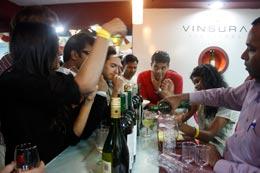BC eyes Indian wine market

BC wines are making a splash in India but it is a long term market and not for the faint hearted vinter, says a leading Indian expert.
The BC government is actively supporting its wineries in making inroads in the Indian market and introducing wine producers to qualified and interested wine importers, said entrepreneur Subhash Arora, Founder President of Delhi Wine Club.
British Columbia, has declared its intentions to enter the Indian market with wine, seafood and specialty foods, with the support and encouragement of the provincial government, wrote Arora on Indianwineacademy.com.
He conducted a seminar recently through video conferencing from New Delhi with the BC producers in Vancouver.
Arora said here has been a sea change in knowledge about BC in India this year, thanks to the maiden TOIFA (Times of India Film Awards) held in April, 2013 in Vancouver which was sponsored by the provincial government to the tune of over $10 million.
Arora gave an overview about the Indian wine market, its opportunities but also its threats and difficulties for international wine producers.
“For British Columbian wine exporters there are significant opportunities in its high quality wines including ice wines but it is a long term market not for the faint hearted,” he stressed.
In total there were 12 wine producers and exporters that participated in the recent seminar. Out of these, Kalala Organic Estate Winery, Summerhill Pyramid Winery and Pyramid Wine Exports who are already selling their wines in India.
Kalala Organic Estate Winery is located on the Upper Bench of West Kelowna in the Okanagan Valley.
Started by Karnail Singh Sidhu and family, Kalala has been making award winning, reasonably priced wines since July 2006. The vineyards were deemed certified organic in September 2010.
Sidhu has an interesting tale about the origins of his operations.
“Many wonder how Kalala Organic Estate Winery got its name. The legend comes from my grandparents who told me the story of how the village where I was born came to be. The story says that long ago, in Northern Bharat, India, farmers were tending to their animals when they came across a wolf and lamb sitting together in a beautiful valley. This peaceful coexistence was so inspiring that they moved their village to this very spot, in hopes that the same harmony would be reflected in their village, and named it “Miracle Place”, or “Kalala” in Punjabi.
I felt that this was reflective of the Okanagan Valley and our pursuit to grow our grapes in harmony with nature. So in a tribute to my home town, I named my winery after this miraculous place.”
Arora said a F & B trade mission which will include BC wine producers plans to visit the Annapoorna World of Food Trade Show in September.
According to Lindsay Kelm of the British Columbia Wine Institute British Columbia has 217 licensed grape wineries spread over five designated viticultural areas-Okanagan Valley, Similkameen Valley, Fraser Valley, Vancouver Island & Gulf Islands. Over 80 grape varietals are being produced including pinot gris, chardonnay, gewürztraminer, riesling and sauvignon blanc in white and merlot, pinot noir, cabernet sauvignon, syrah and cabernet franc in the red category, being the top varietals.
The Indian wine market is growing at 30-40% annually and this rate will continue for the next 5-6 years in keeping with global trends. However, the current per person per year consumption of wine in the country is as low as 9-10 ml, said a report
The Maharashtra Industrial Development Corporation has mentioned this in its note on the grape wine industry of Maharashtra, based on a report prepared by Rabo International Bank. The highest wine consuming countries such as France and Italy has per person wine consumption as high as 60 to 70 litres annually. Those in China consume four litres, the report stated.
The MIDC report further stated that India currently imports 72,000 wine cases (nine litres to a case) a year. About 32,000 of this is bottled at origin and the other 40,000 cases are imported in bulk flexi bags, which are subsequently bottled by Indian wineries. Besides this, about 12,000-15,000 wine cases are sold through the grey market.
Leave a comment









